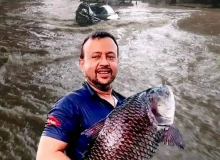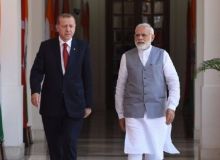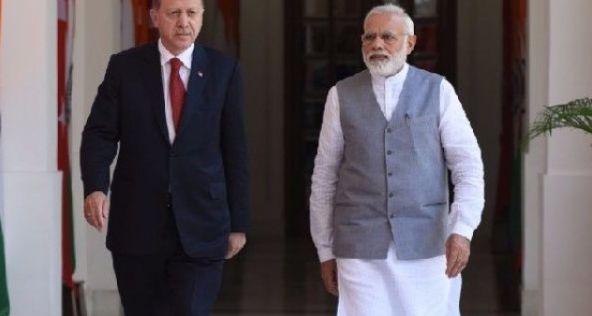
Rafsan Ghalib, editorial assistant, in Prothom Alo (August 12, 2023)
Summary by Alejandro Reyes (Photo credit: Facebook)

A large area of Chittagong city, almost half of it, has been submerged in water due to continuous rains. People are posting photos of the drowned areas on Facebook with the names of different rivers or cities in Bangladesh but which are called "European". There is now a viral meme on social media of the Bengali cinema hero Riaz standing in the middle of a river, holding a huge cut fish. There is no end to the posting of this image. The name of Riaz has now become synonymous with the flooding of Chittagong. But why?
The origin goes back to the participation of hero Riaz and other actors and personalities in the last mayoral campaign. They came from Dhaka and traveled around in open trucks and campaigning for the Awami League candidate. Riaz lauded the road on which they came to Chittagong, saying that it did feel like a road in Bangladesh but more like one in Europe. Yet he must have seen the conditions of other roads in the city and the chaos on the streets. As one commentator put it, how could he compare Chittagong’s roads with Europe from just one example? People are making fun of Riaz because of this. He has become a source of laughter, a meme.
City expansion, residential area construction and development projects have destroyed so much of Chittagong by cutting one hill after another, resulting in flooding many times every year. One schoolteacher said: “The roads may be like in Europe to hero Riaz, but not to me. We the people, who suffer from floods every year, know [the reality]. The hero has become a villain to some people.”

Faizul Islam, Treasurer, Bangladesh Development Initiative, in bdnews24.com (August 18, 2020)
Summary by Alejandro Reyes (Photo credit: Prime Minister’s Office)

Two headlines – “Erdogan joins thousands in first prayers at Hagia Sophia” and “Modi lays foundation stone for Ram temple in Ayodhya” – have captured international media attention. History is replete with instances of political leaders using their faith to conceal their weaknesses and failures as well as promote their own personal agenda. Turkey’s President Recep Tayyip Erdogan and India’s Narendra Modi join that growing list.
On Ju 24, Erdogan took part along with tens of thousands in Friday prayers in Hagia Sophia, seated on the first row, reciting the Quran in fluent Arabic in a melodious voice. Hagia Sophia was built as a cathedral by the Byzantine Emperor Justinian in 537. The church was converted into a mosque after the 1453 Ottoman conquest of Istanbul. The founding leader of the secular Turkish republic, Mustafa Kemal Ataturk, converted the mosque into a museum in 1934.
In July, ignoring criticism from around the world, Erdogan issued a decree restoring the iconic building as a mosque, soon after a Turkish high court ruled that the Hagia Sophia had been illegally made into a museum more than 80 years ago.
A similar scenario just took place in India. On Aug 5, Modi offered prayers and laid a ceremonial foundation stone for a grand Hindu temple at the site believed to be the birthplace of Lord Ram in Uttar Pradesh’s river city of Ayodhya. Hindus believe Muslims built a mosque – the Babri Mosque – over the temple in the 16th century.
In essence, the Hagia Sophia or the Ayodhya Hindu temple as religious edifices demonstrate that political leaders will use their religion to change the narrative of the time and engage in cultural wars to promote their self-interest.

Saifur Rashid, Professor of Anthropology, University of Dhaka, in Dhaka Tribune (July 5, 2020)
Summary by Alejandro Reyes (Photo credit: Nurunnaby Chowdhury (Hasive))

We know that public universities stand to provide any student, irrespective of their financial background, an education upon passing the competitive admission process. They are not like private universities, where students have to spend a lot of money to get a degree, although they have some scholarships for the poorer students.
Historically, the students and faculties of the University of Dhaka (DU) have not only been engaged in learning, teaching, and research but have also been playing a very significant role in various social, cultural, and political movements in the country.
Despite various limitations, DU is still ranked as the best university in the country. But we can’t be happy with this. We want to make our university world class. Before celebrating the centenary of DU in 2021, we need to examine our methods and figure out how we can take our university to a certain height by raising the quality of teaching and research.
How are we going to live up to the challenge of branding the university, which was once called the “Oxford of the East,” and meet the standards set by the development of science, technology, and the liberal arts in the 21st century?
The alumni can come forward to raise sufficient funds for research and provide scholarships to the students to go to the best universities for higher education. To make DU one of the finest seats of learning regionally as well as globally, we need to prepare a 25-year perspective plan with immediate, mid- and long-term targets.
Every member of DU and its alumni who are proud of their engagements and contributions to building the nation would also like to feel more pride by rebuilding the image of this university and converting it to a world class center for the production and dissemination of knowledge.

Ali Riaz, Distinguished Professor, Department of Politics and Government, Illinois State University, in The Daily Star (April 21, 2020)
Summary by Alejandro Reyes (Photo credit: Andrea Hanks/The White House)

President Donald Trump's decision to halt funding to the World Health Organization (WHO) in the midst of a global pandemic is not only reckless and irresponsible, but will also exacerbate the threat to global public health.
Domestic considerations, precisely his focus on his support base, as the driver of his policies—domestic and foreign, have brought disastrous consequences for the United States in the past years. That he and his supporters seem to have very little regard for data, science and diplomacy is on display here, once again. The decision is consistent with Trump's previous actions and his contempt for multilateral institutions. The so-called "America First" policy, which has essentially become the "America Alone" policy, is behind the decision and will further isolate the US from its allies.
In past years, the global standing and influence of the US has eroded, thanks to the changing global political landscape, the rise of China and Russia, the failure of leadership of the Trump administration on global issues, the distance with allies through unilateral foreign policy, and withdrawals from various multilateral arrangements. The failure to contain Covid-19 has revealed a serious weakness not just in public health infrastructure but also in the entire US political system. By contrast, China has been engaged in an aggressive diplomacy since the epidemic began, taking active measures to rewrite the narrative, absolving its responsibilities in the spread of the virus, and remaking its image as a "friend in need".
The US decision to defund the WHO shows the absence of empathy and a disregard for the people of the world. The global pandemic and economic crisis will require global cooperation among countries. The myopic policy of the Trump administration sends the message that the US is abdicating its claim to global leadership.

Kaiser Kabir, CEO of Renata Limited, in Dhaka Tribune (April 21, 2020)
Summary by Alejandro Reyes (Photo credit: Asian Development Bank)

Most people are aware of the exponential curve that tracks epidemics. It is only through mass testing of random populations that we can get an idea where the disease situation of a country lies on the curve.
Apart from random testing, testing of people showing symptoms of the disease can lead to accurate decisions about isolation or release back into the community. However, these two approaches require many more tests than the government is doing at the moment. There is a general distrust of rapid antibody test kits because of their unreliability.
Moreover, there are only a handful of laboratories carrying out the more sophisticated polymerase chain reaction (PCR) tests. It is vital that testing is ramped up to from a mere 2,000 a day to, say, 100,000 a day. In this regard, the private sector can have a hugely supportive role.
We are all aware that a prolonged lockdown is unsustainable. However, financial distress cannot be the impetus to relaxing a lockdown. Prematurely opening up the economy would invariably lead to mass transmission of the disease forcing us back into lockdown. After all, the sick, dying and dead do not make good workers.
Science must be the only guiding principle in relaxing a lockdown, and hence there is no alternative to mass testing. The government cannot do it all. We in the private sector are ready to offer a helping hand. We appeal to the government to accept our support.



Asia Global Institute
The University of Hong Kong
Room 326-348, Main Building
Pokfulam, Hong Kong
asiaglobalonline@hku.hk
+852 3917 1297
+852 3917 1277
©2025 AsiaGlobal Online Journal
All rights reserved. Terms of Use - Privacy Policy.
Opinions expressed in pieces published by AsiaGlobal Online reflect those of the authors and do not necessarily represent the views of AsiaGlobal Online or the Asia Global Institute.
The publication of AsiaGlobal Voices summaries does not indicate any endorsement by the Asia Global Institute or AsiaGlobal Online of the opinions expressed in them.

Check out here for more research and analysis from Asian perspectives.
